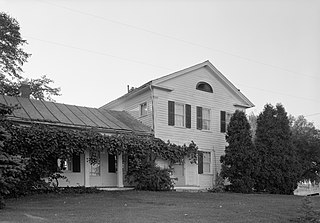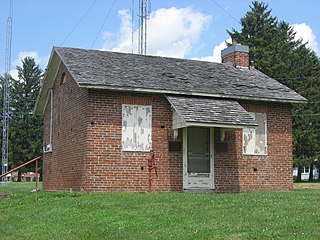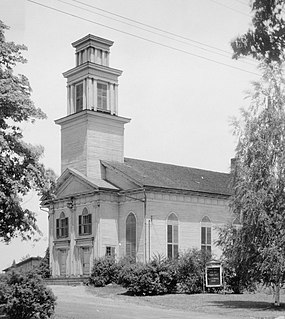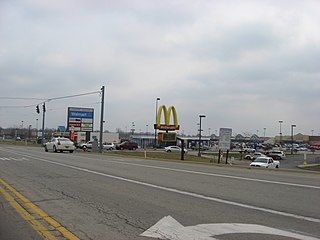
The George Bennett House was a historic residence built near the city of Harrison, Ohio, United States. Constructed during the middle of the nineteenth century, it was a prominent building along one of the area's major roads, and it was eventually named a historic site.

The A.M. Detmer House is a historic residence in Cincinnati, Ohio, United States. Constructed in the 1880s, it has been named a historic site as an example of the work of a prominent architect.

The Daniel Thew Wright House is a historic residence in the far western part of Cincinnati, Ohio, United States. Located in the neighborhood of Riverside, it was originally home to lawyer and federal judge Daniel Thew Wright, and it has been named a historic site because of its distinctive architecture.

Hunting Lodge Farm is a historic house located near Oxford in Oxford Township, Butler County, Ohio, United States. Constructed as a hunting lodge, it has been used by multiple prominent local residents, and its distinctive architecture has made it worthy of designation as a historic site.

The James D. Conrey House is a historic house located on an old intercity road in southeastern Butler County, Ohio, United States. Although the identification is unclear, it may have once been a tavern on the road, which connects Cincinnati and Columbus. A well-preserved piece of the road's built environment, it has been designated a historic site.

The Darlon Allen House is a historic residence located near Wellington in southern Lorain County, Ohio, United States. One of the most significant farmhouses in an area known for its historically important architecture, it has been named a historic site.

The Charles Rice Ames House is a historic residence in the city of Belpre, Ohio, United States. Built in 1843 in the Greek Revival style of architecture, the house has been named the region's most outstanding Greek Revival structure.

Carlos Avery House is a historic house in the Pittsfield Township, Ohio.
Hathaway House may refer to:

The Studabaker-Scott House and Beehive School are two historic buildings near the city of Greenville in Darke County, Ohio, United States. Located along State Route 49 south of the city, both are unusually well-preserved remnants of the architecture of the middle third of the nineteenth century.

The Hollister-Parry House is a historic residence in the village of Woodsfield, Ohio, United States. Built in the middle of the 19th century, it has been named a historic site and converted into a museum.

The James Boggs Tannehill House is a historic residence in Zanesville, Ohio, United States. Constructed in 1892, it was the home of two of Muskingum County's leading citizens in the late nineteenth and early twentieth centuries, and it has been designated a historic site.

Claridon Congregational Church is a historic church building on U.S. Route 322 in Claridon Township in Geauga County, Ohio.

The Auburn Free Will Baptist Church is a historic former Baptist church building in Auburn Township, Geauga County, Ohio, United States. Constructed in the second quarter of the nineteenth century, it is no longer home to the congregation that built it, but it remains a significant component of the area's built environment, and it has been named a historic site.

The Randolph Mitchell House is a historic house in the small community of New Reading, Ohio, United States. One of the most prominent old buildings in the area's oldest settlement, it was once the home of a leading local resident, and it has been named a historic site because of its distinctive Neoclassical-influenced architecture.

The William Burnett House was a historic farmhouse located near the city of Washington Court House in Fayette County, Ohio, United States. Constructed in the nineteenth century, it was once a masterpiece of multiple architectural styles, and it was designated a historic site because of its architectural distinction.

The Jacob Light House is a historic residence in the city of Washington Court House, Ohio, United States. Once home to a prominent local craftsman, it has been designated a historic site as a well-preserved example of the Italianate style of architecture.

The Rawlings-Brownell House is a historic residence on the northern side of Washington Court House, Ohio, United States. Built during the middle of the nineteenth century, it was home to the man who established the neighborhood in which it is located, and it was later the home of a leading merchant. Although constructed in one architectural style, it was later partially converted into another style, becoming a good example of changes in the community's architectural tastes. It has been designated a historic site.

The Rombach Place is a historic house in the city of Wilmington, Ohio, United States. Built in the first third of the nineteenth century, it was home to a family that produced two prominent national politicians. No longer used as a residence, the house is now a museum, and it has been named a historic site.

The Patrick Hull House is a historic residence in rural Carroll County, Ohio, United States, near the community of Oneida. Constructed in the 1830s for a leading resident of the area, it has been named a historic site.





















